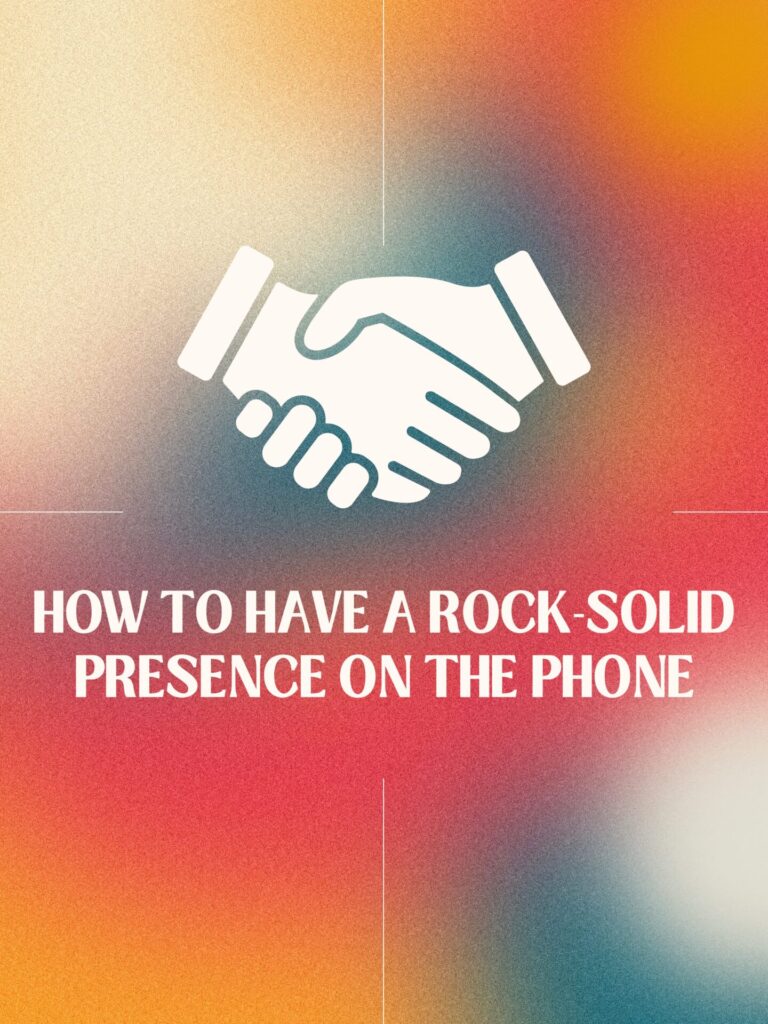
For generations prior to cell phones and high-speed internet, sales were closed by a combination of knowledge, experience, physical demeanor, and a firm handshake.
The WAY you presented was almost as important as HOW you presented. These days everything has gone digital. Our cash is now housed on little pieces of plastic, our content is consumed in 60-second clips, and we sign for purchases using our finger on a touchscreen.
Yet the power behind a tactful conversation, and the poise of intention, is highlighted now more than ever. In the world of spam calls and robo-dialers, it’s easy to stand out as a leader in your field.
Here are eight of the best things to work on if you want to stand out and have a ROCK-SOLID presence on the phone:
1. High-Energy Engagement: Imagine yourself as the conductor of a symphony. From the moment you utter the first “Hello,” your energy sets the tempo for the entire conversation. Speak with enthusiasm and conviction, letting your passion for your product shine through. Your goal is to create a sense of excitement and urgency that compels the prospect to lean in and pay attention.
2. Command the Call: You’re not just a participant in the call; you’re the captain of the ship. Take control from the outset by guiding the conversation in the direction that best serves your objectives. Use assertive yet respectful language to steer the discussion toward key talking points and desired outcomes. By maintaining control of the call, you ensure that both your time and the prospect’s time are used effectively.
3. Make It Personal: In a world FILLED with generic sales pitches, personalization is your secret weapon. Take the time to research your prospect’s area, needs, and potential interests. By demonstrating a genuine understanding of their situation and offering solutions tailored to them, you establish rapport and build trust from the outset.
4. Assume It’s Go Time: Time is of the essence in the fast-paced world of sales. Rather than seeking permission to move ahead with your pitch, confidently assume that the prospect is ready and eager to engage. Frame your introduction in a way that conveys respect for their time while emphasizing the value and relevance of your message. By adopting this proactive mindset, you set a tone of decisiveness and urgency that motivates the prospect to stay engaged.
5. (Speaking of Urgency…) Press that Urgency Button!: The clock is ticking, and opportunity waits for no one. Add a sense of urgency into your pitch and emphasize the consequences of delaying action. Paint a vivid picture of the benefits they stand to gain by acting now. By creating a sense that inaction is riskier than making a change, you compel the prospect to make a swift and decisive decision, to their benefit!
6. Dial Up the Humor: Laughter is not only the best medicine; it’s also a powerful bonding tool. Break down barriers and foster a relationship with your prospect by injecting humor into the conversation. Whether it’s a witty callback, a clever anecdote, or a well-timed joke, humor humanizes the interaction and cultivates a positive emotional connection. Just remember to keep it tasteful and relevant to avoid veering off course.
7. Smile Through the Wire: They may not see your smile, but they can certainly hear it in your voice. Grow a positive and upbeat demeanor by maintaining a genuine smile as you speak. Smiling not only alters the tone of your voice, making it warmer and more inviting, but it also projects confidence and enthusiasm. If you see a co-worker looking bored or upset on a call, remind them that their energy shines through, good or bad.
8. Embrace the Silence: In the world of sales, silence is anything but golden—it’s downright powerful. After delivering your pitch, resist the urge to fill the void with unnecessary chatter. Instead, embrace the silence and give the prospect space to process the information and to respond. By remaining quiet and attentive, you convey confidence in your message and invite the prospect to take the next step. Remember, sometimes the most profound statements are made in the absence of words.

